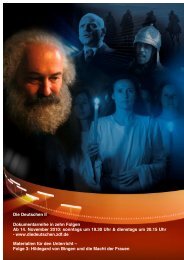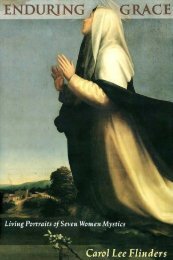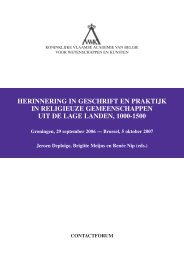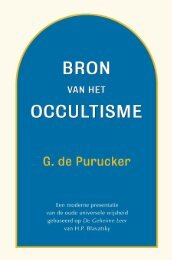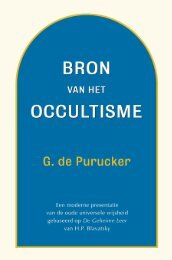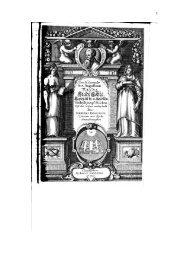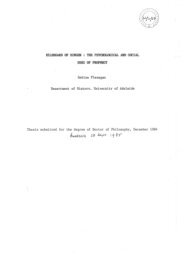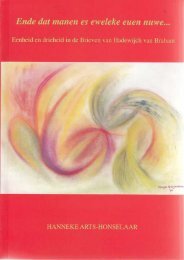A Companion to Hildegard of Bingen
Beverly Mayne Kienzle, Debra L. Stoudt & George Ferzoco, "A Companion to Hildegard of Bingen". BRILL, Leiden - Boston, 2014.
Beverly Mayne Kienzle, Debra L. Stoudt & George Ferzoco, "A Companion to Hildegard of Bingen". BRILL, Leiden - Boston, 2014.
- TAGS
- hildegard-of-bingen
Create successful ePaper yourself
Turn your PDF publications into a flip-book with our unique Google optimized e-Paper software.
hildegard <strong>of</strong> bingen and the hirsau reform 67<br />
along with a few other pious women. Paul was particularly impressed by<br />
her reputation for experiencing visions and revelations, as he describes in<br />
both his Gregorii VII Vita and his Vita beatae Herlucae. He relates how she<br />
once had a vision <strong>of</strong> Jesus Christ with wounded hands, and then one <strong>of</strong><br />
Wicterp, the 7th-century bishop <strong>of</strong> Augsburg <strong>to</strong> whose memory Herluca<br />
was devoted. Wicterp asked her if she was not horrifijied by the bloody<br />
wounds <strong>of</strong> the Savior, and whether she wanted <strong>to</strong> see them again. When<br />
she said that she did not, Wicterp then replied: “Then do not listen any<br />
more <strong>to</strong> the Masses <strong>of</strong> Richard the Priest, who does not wish <strong>to</strong> preserve<br />
the chastity due <strong>to</strong> his <strong>of</strong>ffijice.” Richard, the priest <strong>of</strong> the church <strong>to</strong> which<br />
Herluca was attached, had been the target <strong>of</strong> some suspicion that he had<br />
been excessively intimate with her companion Douda. After this episode,<br />
Herluca confronted the priest <strong>to</strong> get him <strong>to</strong> mend his ways and inspired<br />
the local congregation <strong>to</strong> do the same.36 Another report <strong>of</strong> her visionary<br />
gift is a s<strong>to</strong>ry <strong>of</strong> how one day she suddenly exclaimed, “Woe, woe, woe <strong>to</strong><br />
that man. It was better for him if he had not been born!” When a female<br />
companion asked why she said this, she explained that at that moment<br />
she had seen the soul <strong>of</strong> a certain unchaste priest taken down in<strong>to</strong> hell<br />
by demons.37 Paul presented Herluca as sympathizing closely with the<br />
campaign <strong>of</strong> Gregory VII against morally corrupt clergy. Although Paul<br />
presented her as an unlettered woman, she apparently exchanged “truly<br />
comforting letters” with another recluse, Diemut <strong>of</strong> Wessobrun, who is<br />
only known from an 18th-century record, which states that these letters<br />
were still kept at Bernried.38 Diemut was a celebrated scribe, known <strong>to</strong><br />
faceret conversandi stabilitatem. Tales ergo duces secuta, continuavit habitationem suam<br />
Eptatici plus minus triginta sex annos.”<br />
36 Paul <strong>of</strong> Bernried, “Gregorii VII Vita,” in Pontifijicum Romanorum . . . Vitae, ed. Johannes<br />
Matthias Watterich (Leipzig, 1862, reprinted Aalen, 1966), 1, p. 542: “Felicis namque memoriae<br />
virgo Herluca, cui familiares erant visiones et revelationes Domini cum informationibus<br />
apos<strong>to</strong>lorum fijideli relatu nobis insinuavit, quod ipsa vice quadam, dum solitaria<br />
resedisset in cellula sua, subi<strong>to</strong> viderat Dominum Iesum ad se introire, comitante bea<strong>to</strong><br />
Wicterpo, Augustensis ecclesiae quondam praesule habi<strong>to</strong>que paulisper silentio, subsistere<br />
et vulnera tantum sua cruore manantia ostendere. Cumque horripilasset a timore<br />
visionis insolitae, afffatus est eam episcopus ita dicens: Abhorresne, soror, a cruenta specie<br />
Salva<strong>to</strong>ris? Ait: etiam Domine. Vis eum, inquit, taliter ulterius non videre? Respondit:<br />
Volo. Noli, inquit, ergo amodo Richardi presbyteri missas audire, qui debitam tan<strong>to</strong> <strong>of</strong>ffijicio<br />
castimoniam non vult cus<strong>to</strong>dire. Sic etnim vocabatur presbyter, qui illi ecclesiae indignus<br />
praeerat, iuxta quam virgo Deo dedita manebat. Ex tunc eum publica visitatione confutavit<br />
et exemplo suo plebem ut idem faceret animavit.” Cf. Vita B. Herlucae 22, p. 554.<br />
37 Paul <strong>of</strong> Bernried, “Gregorii VII Vita,” 115, pp. 542–43.<br />
38 See the entry “Herluca” in Bibliotheca Sanc<strong>to</strong>rum, ed. Filippo Carafffa, vol. 5 (Rome,<br />
1964), p. 7, quoting from Magnoald Ziegelbauer, His<strong>to</strong>ria rei litterariae Ordinis B. Benedicti 3<br />
(Augsburg, 1754), pp. 494–96: “Extant adhuc epis<strong>to</strong>le suaves valde in monasterio Beronica,<br />
quod vulgariter nunc dicitur Pernried, per ipsam [Diemut] virginem sanctam misse, et




